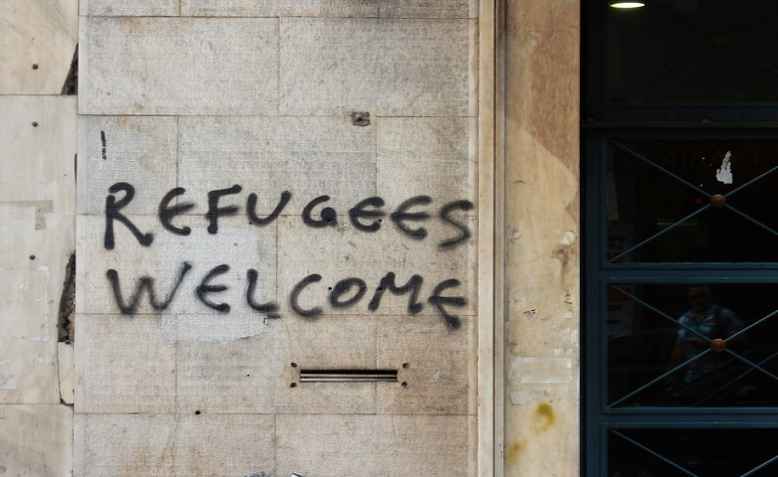 Refugees Welcome, Exarchia, Athens. Photo: aesthetics of crisis
Refugees Welcome, Exarchia, Athens. Photo: aesthetics of crisis
Attacks on refugees in Greece are indicative of the situation throughout Fortress Europe, argues Eleftheria Kousta
During the build up to the elections the Greek police forces were commissioned with the task of raiding squats in the central Athens area, mainly around Exarchia, evicting the refugees living inside and issuing deportation orders for those unable to present documentation.
Thus far the police forces have raided four of them, making around 200 people homeless, whilst the Greek urban centres already have thousands sleeping on the streets and most refugee camps in the periphery have already exceeded capacity. Some NGOs have managed to secure shelter for some vulnerable individuals such as pregnant women and minors, but only in small numbers.
All this came right after the previous Syriza government stopped monetary assistance and accommodation provisions for refugees. Since the right wing New Democracy (ND) came to power, Kyriakos Mitsotakis has pledged to ‘pacify’ the area of Exarchia and re-establish government control there. This means that refugees in these areas will be directly targeted by the police.
The tactic of appearing ‘tough’ on migration to appease voters has been employed by all Greek governments regardless of where they sit on the political spectrum. In 2013, the ND under Adonis Samaras unleashed operation ‘Xenios Zeus’ in which the police in the Athens centre area embarked on a ‘stop and search’ mission leading to the detention of approximately 10,000 migrants fitting the ‘illegal’ profile. It turned out that only 3,000 were actually undocumented.
The left-wing government of Alexis Tsipras employed the exact same measures in order not to lose face. As of 2019, ND under Mitsotakis is as right wing as it gets on the issue of migration and it has enabled a race to the bottom against refugee protection. The neo-Nazi Golden Dawn are out of the parliament as they couldn’t secure enough votes to overcome the 3% threshold, but the Hellenic Solution managed to replace GD’s ideological functions in the parliament with 3.7% of the vote, which translated into 10 seats. This indicates that the element of national populism and anti-immigration remains in Greek politics. However, their ejection from formal politics is a major step in the fight against the organized far-right that should not be underestimated and can eventually act as a check against the malign policies of the ND.
In Greece hate-crime incidents have gone up and are mostly directed at refugees and migrants according to a recently released report. This comes after reports from the EU Commission and Human Rights Watch documented that illegal push-backs into Turkey have taken place in the Evros border area, carried out by what seem to be paramilitary groups with the acquiescence of the Greek police forces.
Police forces have also been investigated for allegations of abuse in lockup facilities and detention centres, the most recent leading to the death of Nigerian father and migrant Ebuka Masoubek in the police department of Omonoia, Athens. The Greek police have a long history of violence that has not been well documented. In an open letter to the newly elected prime minister Mitsotakis, Human Rights Watch called for his government to put an end to unlawful detention of migrant children and push backs from Northern Greece to Turkey among others.
Yet, post-2015, and with the international community’s attention to the refugee crisis taking place, reporting is slowly becoming more widespread, shedding light on this issue and mobilizing action by activist groups. At the judicial level some successes have been achieved with the support of left-wing and pro-immigrant advocates. A court in Athens, for example, convicted the murderers of the migrant worker Shahzad Lukman and gave them life sentences. Violence against refugees continues but more and more cases are addressing the abuses and the institutional injustices.
The authorities hope that refugees will lose support and, failing to be absorbed in the stagnant Greek labour market, will move on. But stricter border movements and push-backs from other EU countries make this policy unfeasible, as for many of the refugees and asylum seekers repatriation or return to a non-EU transit country is simply not an option. Prime Minister Mitsotakis has found friends in EU High Commissioner Dimitris Avramopoulos (former ND member) and the EU border-policing force FRONTEX for his plans to strengthen border controls and accelerate deportations to Turkey.
Of course the case of Greece is not unique as almost all EU states have engaged with forms of push-backs in one way or another or tried to forgo obligations relating to processing asylum claims. There are reports of deportations of thousands into Afghanistan from Germany, crack downs in Calais, Italians suspending ‘search and rescue’ missions abandoning asylum seekers in the mercy of the Libyan coastguard, push-backs in Hungary and Macedonia and fencing of border areas from Evros in Greece to Ceuta and Mellila in Spain. EU states have been remarkably coordinated in their attempts to instill and normalize ‘Fortress Europe’ – which the EU itself has sanctioned despite maintaining a ‘rights-based’, liberal rhetoric. If there is a crisis in the EU, it is not about the influx of people, it is about elite politics and power.

